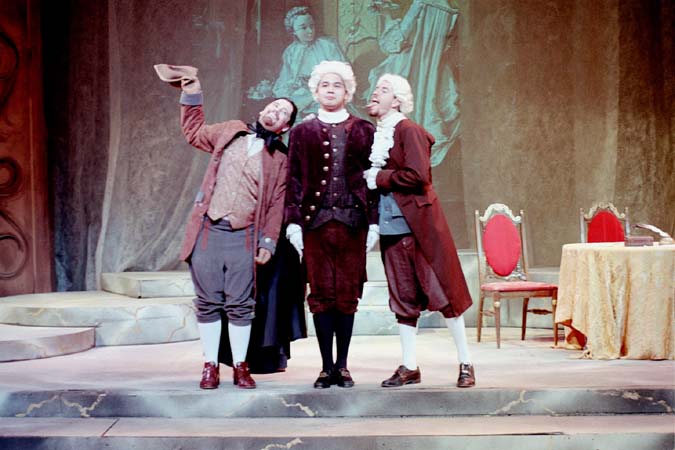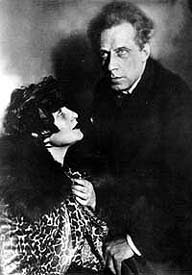We step on stage always from the audience; our transformation from spectator into actor is dramatic. Coming on stage we leave behind us -- the public. We remember our first theatrical existence...
Audience is "Given Circumstances" -- it's not only inner and outer situation of my character. Performance "Givens" and I, space, text, public. I and public are united by space (theatre as an aesthetic situation provided by the theatre-building). Time, now -- and text (role) brings the separation (and indentification at the same time).
Even with no language I position myself outside of my own experience (rehearsals, repetitions create non-real experience).
I am Many, I have to have more than one out there. Without "them" I don't have "timed space" to react to...
Audience: Birth of Actor...
Method Acting
Theatre Biomechanics
Featured Pages: Film Directing NEW :
Transition from Actor (II) to Specticle (Part III): Adolphe Appia Light and Space, Gordon Craig The Artist of the Theatre (138, 147)
Read Konstantin Stanislavsky Creative Work with the Actor (109)
George Bernard Shaw The Art of Rehearsal (192)
Tyron Guthrie An Audience of One (245)
First, read Acting One! Stanislavsky: «In spite of my great admiration for individual splendid talents I do not accept the star system. Collective creative effort is the root of our kind of art. That requires ensemble acting and whoever mars that ensemble is committing a crime not only against his comrades but also against the very art of which he is the servant».
Summary
Directing Genre: Hamlet, Mikado, 3 SistersQuestions?
Read: KONSTANTIN STANISLAVSKY (1863-1938) Creative Work with the Actor; A Discussion on Directing [APRIL 13th AND 19th, 1936] "Directors on Directing"Notes
What is for finals? One "class project"?Together with acting classes!
 REHEARSAL * (from Latin hirpex - "large rake used as a harrow". Rehearse means "re-harrow", or to "go over again". It originally meant "to repeat" (mid 14th century). It wasn't until the late 16th century that it came to it's modern meaning.) * A session when actors are called to work through some scenes from the play in private. A TECHNICAL REHEARSAL is the first time when technical elements (lighting, set etc.) are combined with actors. A DRESS REHEARSAL is a performance of the show as it will be on opening night.
REHEARSAL * (from Latin hirpex - "large rake used as a harrow". Rehearse means "re-harrow", or to "go over again". It originally meant "to repeat" (mid 14th century). It wasn't until the late 16th century that it came to it's modern meaning.) * A session when actors are called to work through some scenes from the play in private. A TECHNICAL REHEARSAL is the first time when technical elements (lighting, set etc.) are combined with actors. A DRESS REHEARSAL is a performance of the show as it will be on opening night.
"The highest and final aim of every true artist, whatever his particular branch of art, maybe defined as the desire to express himself freely and completely." Michael Chekhov 'To the Actor'
acting basics *
Lee Strasberg On Acting
"It seems to me that, in common with many of the other areas of knowledge which have been explored in the twentieth century, it is important to stress that one of the basic emphases in the knowledge about theatre today is the idea that the theatre is essentially a creative art. The fact that it uses the script as a basic item should not be interpreted as making it only an interpretive art. An interpretive art is an art in which one uses material in the same art to imitate. And in this sense, we should recognize the theatre as today being a creative art.
I would say that the most characteristic part of the theatre is unquestionably the actor. The theatre can do without scenery; it can do without the director; it can often do without words. But it cannot do without the living actor. When you have no actor, you have no theatre. Once you have an actor, you have theatre.
When you compare the various versions, let’s say of a performance of Hamlet, by different actors, you will find that they bear very little relation to the original, whatever the original may be. In fact, we hardly know what the original is intended to be or is intended to mean. Each time we see an actor in that part we are really seeing an actor creating a new character. He may get his ideas obviously from the author, in the same way that a painter who paints a certain object in nature is receiving his ideas and impressions from that object, but what he does is dependent intrinsically on his own creative capacity, on his own imagination, on his own understanding, and on his own skill.
With every art we argue very much as to which is really creative and which is only imitative. On the whole we tend to think that the creative thing, the creative approach, the creative method, if you wish, demands a fresh, original and spontaneous experience of whatever it is that is being dealt with. Wherever that experience is only derived as an imitation of someone else’s experience, it therefore, even when very good, tends only to be skillful, rather than to be creative. However, on almost any definite given object in any field, there is a wide area of difference of opinion as to what people will call it. We are up against the certain difficulty that exists in separating "creative" from "noncreative" in any area."
Why should an actor not walk on someone else's line?
If an actor walks on someone else's line, he will steal that actor's focus. On the other hand, if the director wants to make sure the audience catches a line, a phrase, or a word, a simple move, gesture, or turn, can be used to catch the audience's attention. This is one of those quick "rules" a director (or actor) can use to give precision and clarity to a performance.
What is the difference between running a scene and working a scene?
When a scene is run the director will not interrupt the rehearsal, but will wait to the end of the scene to make his comments, a process known as "giving notes." When a scene is worked, the director will stop the rehearsal to work on a problem. [ * ]
"Ðàáîòà àêòåðà íàä ñîáîé" *) Âàæíî, ÷òîá îòíîøåíèå ê ðîëè àðòèñòà íå òåðÿëî åãî ÷óâñòâåííîé èíäèâèäóàëüíîñòè è âìåñòå ñ òåì íå ðàñõîäèëîñü ñ çàìûñëàìè ïèñàòåëÿ. Åñëè èñïîëíèòåëü íå ïðîÿâëÿåò â ðîëè ñâîåé ÷åëîâå÷åñêîé ïðèðîäû, åãî ñîçäàíèå ìåðòâî.
ACTORS: AUDITIONS
Method: Mono, Monologues I, Monologues II
Biomechanics: Mono I, Mono II
Acting One: Monologue, Mono I, Mono II
Film Acting
Konstantin Stanislavsky
Book by Bella Merlin; Routledge, 2003 - 1: Biography in Social and Artistic Context
- 2: Summary and Analysis of an Actor Prepares
- 3: Description and Analysis of the Seagull
- 4: Practical Exercises
- Conclusion
- A Brief Glossary of Terms
- Selected Bibliography
The Actor Paradox:
... the great mystery, the great paradox of theatre. If you have a bad actor, he disappears entirely. ... A bad actor is swamped by his role and so he doesn't really know what he's doing... He has become his role. But he has become like a racing car where the driver turns into the car so there is no longer anyone driving it. ...
However, the greater the artist, the truer the actor, what happens is that his personality gives way to his individuality. In other words, the personality - which is a lot of external habits and mannerisms which we all recognize one another by, which we live by - yield to the role. But within the role - and the image I've used is like a hand within the glove - the true individual is totally conscious and filling the space, so he doesn't disappear. One can almost say that he appears, the more completely he has surrendered to the role. And that is why a true artist reaches this paradox: every fiber of him is invested with the role, and yet within in it, there is a space of complete freedom in which he is fully in control.
Peter Brook [ ]
The Art of Acting -- Two Levels:
... One of the exercises I like to do with actors is to ask them to hold up their hand and clench their fist very, very tightly. And then I say to them, "supposing that we take a photograph of that clenched fist, can there be any difference between your fist genuinely clenched because you are angry, or now clenched tightly as possible because I've asked you to clench it?" And of course you can see that there can be no difference, not only externally, but even internally. A clenched fist is a clenched fist. Exactly the same way, the actor should so totally invest his role that whatever angle you put your microscope on, you shouldn't be able to detect two levels.
... Because in the case of the cultivated Western actor, you can actually see that the man is performing. ... Which is why a lot of Western acting is busy and demands a lot of superficial activity, which signals to the audience that the actor is working hard. And that is an essential mode of virtuosity among Western actors.
... Now you can choose between the two forms of theatre art, and I personally believe that the art which vanishes completely is superior to the art of virtuosity, where you're conscious of the skill of the performer.
Brook [ source ]
Acting (Re)considered: A Theoretical and Practical Guide by Phillip B. Zarrilli; Routledge, 2002 - 1: General Introduction - Part I: Theories of and Meditations on Acting - 2: Introduction - 3: The Actor's Presence - 4: On Acting and Not-Acting - 5: “just Be Your Self” - 6: The Actor's Emotions Reconsidered: - Part II: (Re)Considering the Body and Training - 7: Introduction - 8: An Amulet Made of Memory: - 9: Meyerhold's Biomechanics - 10: Etienne Decroux's Promethean Mime - 11: Actor Training in the Neutral Mask - 12: Bali and Grotowski - 13: Culture is the Body - 14: My Bodies - 15: “on the Edge of a Breath, Looking” - 16: The Gardzienice Theatre Association of Poland - 17: Effector Patterns of Basic Emotions - Part III: (Re)Considering the Actor in Performance - 18: Introduction - 19: Brecht and the Contradictory Actor - 20: Dario Fo - 21: Forum Theatre - 22: Resisting the “organic” - 23: Rachel Rosenthal Creating Her Selves - 24: Task and Vision - 25: David Warrilow - 26: Robert Wilson and the Actor - 27: Anna Deavere Smith
Lev Vygodsky On the Problem of the Psychology of the Actor’s Creative Work. [ The Collected Works of L.S. Vygotsky, Vol. 6 ]
comedy scripts Monty Python's Flying Circus
...






